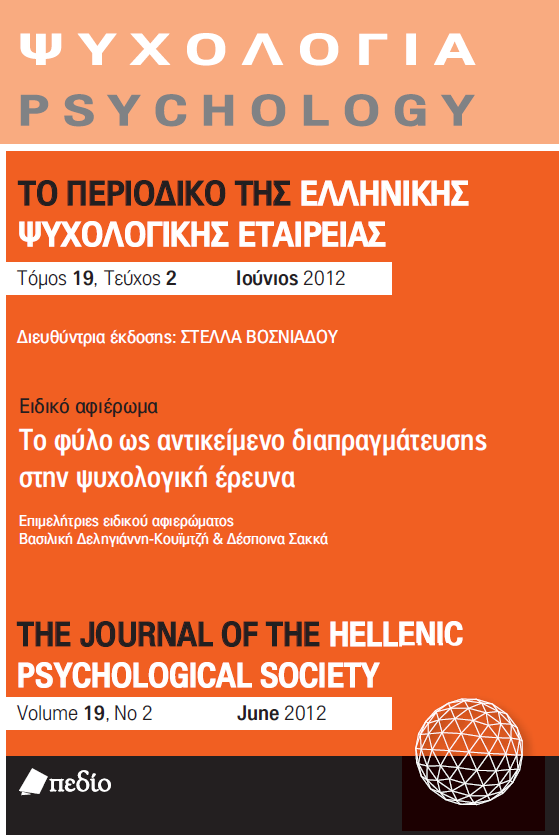Ομοφυλοφιλία, ουσιοποίηση και ταυτότητα στο λόγο ομοφυλόφιλων και ετεροφυλόφιλων ανδρών

Περίληψη
Η ουσιοποίηση των κοινωνικών κατηγοριών και οι συνέπειές της στις διομαδικές σχέσεις αποτελούν ένα από τα προσφιλή ερευνητικά θέματα της κοινωνικής ψυχολογίας. Αντλώντας από τη σχετική εργογραφία, η παρούσα μελέτη διερευνά ουσιοποιητικές και απο-ουσιοποιητικές αναπαραστάσεις για τους ομοφυλόφιλους άνδρες καθώς και τις ταυτοτικές τους λειτουργίες στο λόγο. Για τους σκοπούς της έρευνας διενεργήθηκαν ημι-δομημένες συνεντεύξεις με 16 άνδρες, από τους οποίους οι οκτώ 8 αυτοπροσδιορίστηκαν ως ομοφυλόφιλοι και οι οκτώ 8 ως ετεροφυλόφιλοι. Οι συνεντεύξεις αναλύθηκαν με βάση τις αρχές της λογοψυχολογίας και της ρητορικής. Η ανάλυση έδειξε ότι η φυσικότητα, η ιστορική συνέχεια και η κανονικότητα των κοινωνικών κατηγοριών αποτελούν αντικείμενο διαπραγμάτευσης και επανα-νοηματοδότησης συγκροτώντας ουσιοποιητικές και απο-ουσιοποιητικές αναπαραστάσεις της ομοφυλοφιλίας στο λόγο και των δύο ομάδων. Επιπλέον, παρόμοιες ουσιοποιητικές αναπαραστάσεις στο λόγο τόσο των ομοφυλόφιλων, όσο και των ετεροφυλόφιλων συμμετεχόντων, όπως αυτές που αφορούν τη συνέχεια της ομοφυλοφιλίας στο χρόνο, επιτελούν διαφορετικές ρητορικές λειτουργίες, ενώ διαφορετικές αναπαραστάσεις υποστασιακών γνωρισμάτων επιτελούν κοινές διομαδικές λειτουργίες.
Λεπτομέρειες άρθρου
- Πώς να δημιουργήσετε Αναφορές
-
Μίχος Ι., & Φίγγου Λ. (2017). Ομοφυλοφιλία, ουσιοποίηση και ταυτότητα στο λόγο ομοφυλόφιλων και ετεροφυλόφιλων ανδρών. Ψυχολογία: το περιοδικό της Ελληνικής Ψυχολογικής Εταιρείας, 22(2), 71–89. https://doi.org/10.12681/psy_hps.23256
- Τεύχος
- Τόμ. 22 Αρ. 2 (2017)
- Ενότητα
- ΕΜΠΕΙΡΙΚΕΣ ΕΡΓΑΣΙΕΣ

Αυτή η εργασία είναι αδειοδοτημένη υπό το Creative Commons Attribution-ShareAlike 4.0 International License.
Το περιοδικό ΨΥΧΟΛΟΓΙΑ έχει υιοθετήσει μία πολιτική Platinum open-access. Τα έξοδα υποβολής, επεξεργασίας ή δημοσίευσης των εργασιών καλύπτονται από την Ελληνική Ψυχολογική Εταιρεία. Τα πνευματικά δικαιώματα των δημοσιευμένων εργασιών προστατεύονται από την άδεια 'Creative Commons Attribution-ShareAlike 4.0 International'. Οι Συγγραφείς διατηρούν τα Πνευματικά Δικαιώματα και χορηγούν στο περιοδικό το δικαίωμα της πρώτης δημοσίευσης. Η άδεια αυτή επιτρέπει σε τρίτους, να χρησιμοποιούν την εργασία σε οποιαδήποτε μορφή, με την προϋπόθεση της διατήρησης των διατυπώσεων που προβλέπονται στην άδεια σχετικά με την αναφορά στον αρχικό δημιουργό και την αρχική δημοσίευση στο περιοδικό ΨΥΧΟΛΟΓΙΑ. Επιπλέον, κάθε διανομή της εργασίας οφείλει να γίνεται με τους ίδιους όρους διανομής, δηλαδή με την ίδια άδεια Creative Commons.






